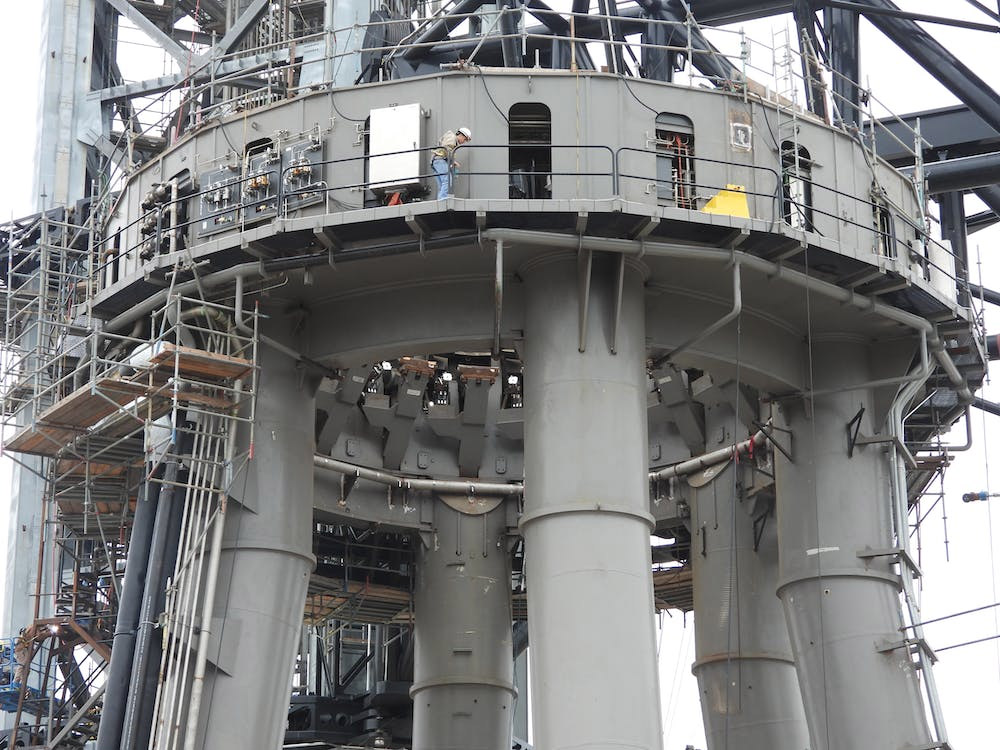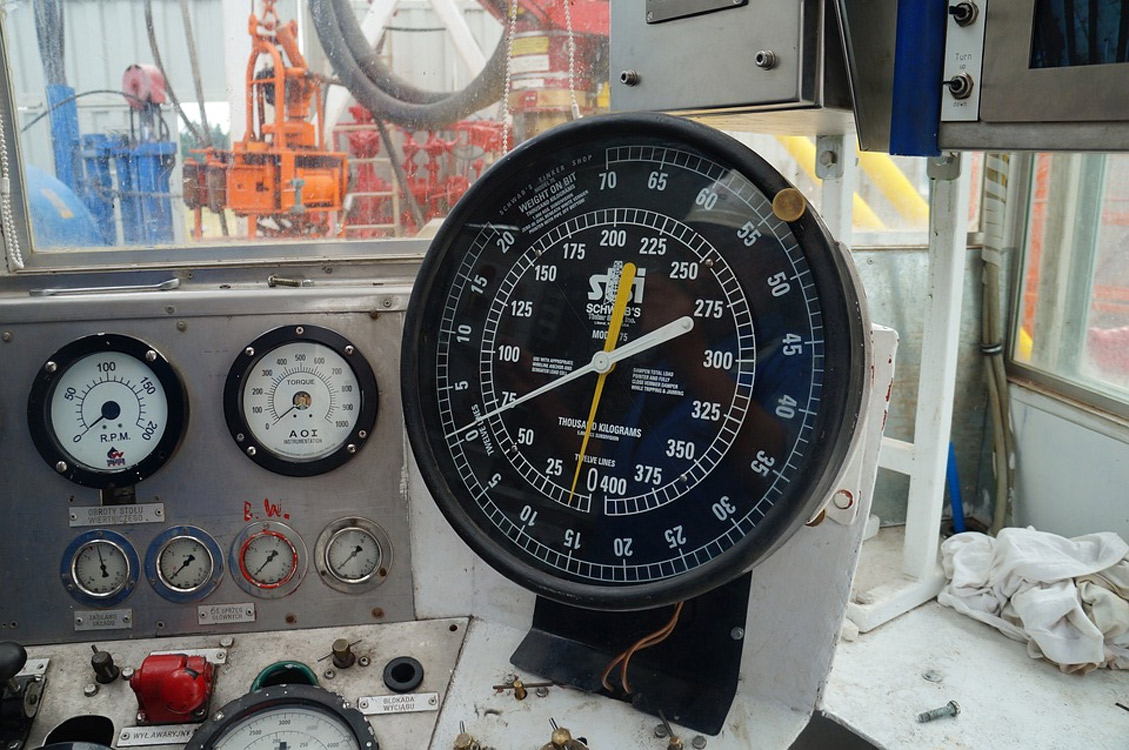
This post presents detailed information on the oil rig electrician job description and career, including the key duties, tasks, and responsibilities they typically perform.
It also shows how to become an oil rig electrician and the key requirements you need to meet to be hired for the role.
What Does an Oil Rig Electrician Do?
The oil rig electrician is responsible for installing, troubleshooting, repairing, maintaining, commissioning, and testing of electrical equipment and systems on oil rigs.
His/her role also involves working on electrical distribution and transmission equipment.
Oil drilling operations usually lead to a high demand for industrial electricians.
Industrial electricians, or “sparky”, as they are often referred to, can work on a rig as an electrician.
The only difference is that working on an oil rig is usually much more cumbersome.
A rig sparky or oil rig electrician is usually employed by the maintenance department of a well and a drilling service contractor of petroleum-producing companies.
As with all electricians, electricians working on oil rigs are bound by the Electric Code of Practice; progression to higher positions is possible with experience and additional licensing examinations.
Job Summary: Working on an oil rig requires long and difficult days. Rig electrical workers are usually on a roster system; they often will work outdoors in all types of weather, or underground, and are part of a crew.
Being an electrician is not an easy work, let alone rig electricians who generally works harder.
The work is physically demanding unlike other office works and the conditions are less than pleasant.
Oil rig electricians work in small spaces barely big enough to move around. Sometimes they could be twisted up in uncomfortable places.
They may have to stand in one place for extended periods of time.
Many times, Oil rig electricians are dirty and dusty, and work in too hot or too cold or wet.
As oil rig electrician, there are times when you may be required to mount to the top of the masts, roofs of buildings or a high tower.
He/she must always be abreast of proper electrical safety regulations and wear safety clothing and use safety equipment to reduce the risk of serious injury.
Oil Rig Electrician Job Description Example/Sample/Template
The duties, tasks, and responsibilities usually performed by most oil rig electricians are shown in the job description example below:
- Make sure that all maintenance work is performed safely in accordance with company regulations and in accordance with good engineering practice
- Collaborate with the Maintenance Supervisor in regards to maintenance, repairs and planning ahead in other to avoid the risk of delay caused by equipment breakdown
- Employ preventative maintenance program in accordance with Client and Company requirements and as directed by the Maintenance Supervisor
- Make sure there is always an enough tools, parts and consumables needed to maintain the equipment for which they are responsible
- Supply required information for updating of drawings, sketches or information on existing and replacement equipment
- Report misuse of equipment to the Senior Maintenance Supervisor
- Take proper care rig instruments and rig tools in their care.
Oil Rig Electrician Requirement: Knowledge, Skills, and Abilities for Career Success
- Must have first Degree in Electrical Engineering
- Must be able to speak and write good English
- Must have up to five years experience working as an Electrician
- Must be physically and mentality fit to do hard job
- Must be ready to work long hours in all weather in difficult conditions
- Must be smart
- Must be able to adapt to harsh working environment.
Oil Rig Electrician Salary
According to ziprecruiter.com, American oil rig electricians make $63,694 per year. The top five paying states for oil rig electricians are Nevada, $72,674; Massachusetts, $72,159; Alaska, $69,493; Washington, $67,060; and New York $65,193.
As at 2022, over 2783 oil rig electricians work in the U.S. Most rig electricians are White (69%). 18.7% are Hispanic or Latino and 7.5% are black or African American.
Oil Rig Electrician Career Advancement
There are several career paths for an oil rig electrician, here is a list:
- Electrical Engineer
An electrical engineer makes more money compared to the average oil rig electrician.
Electricians who have a Master’s degree in Electrical Engineering make even higher.
Although you can work in many electrical engineer positions other than an oil rig electrician, an electrical engineer salary is much higher than their fellow oil rig electricians.
- Maintenance Manager
The oil rig maintenance team is responsible for keeping the oil rigs running at optimal levels.
The maintenance team consists of both skilled mechanics and unskilled labor. The oil rig maintenance team is managed by a maintenance manager.
- Sales/Marketing Director
The sales/marketing director makes good money as well. They are responsible for finding and signing new clients for the oil company.
A professional with an oil rig electrician can fill this position at a related company.
- Project Manager
As an oil rig electrical project manager, you will be in charge of the construction of new or updated oil rigs.
The project manager has to oversee all the engineers, electricians, mechanics, and laborers on the construction site.
An oil rig electrical project manager makes good money along with great job security.

- Electrical Engineer Manager
An electrical engineer manager makes a high salary as well. He/she is in charge of many electrical engineers that work on the oil rig.
His/her job is to keep track of their progress. He/she also has to make sure that they are well-equipped with all the tools they need while working on the construction site.
- Electrical Foreman/Superintendent
The electrical foreman is in charge of several electrical foremen and electricians on a project.
The electrical foreman supervises these electricians and foremen and makes sure that everything runs smoothly.
A typical electrical foreman salary is $73,655 a year.
- Safety Manager/Risk Specialist/Compliance Officer
In order to work on an oil rig, you need to be trained in first aid and CPR. A safety manager is responsible for ensuring that all the workers are trained properly.
A risk specialist oversees everything that goes on a construction site.
They make sure that the safety procedures are up to standard and if they are not, they find ways of improving them.
A compliance officer keeps track of all the regulations and laws.
- Project Planning & Scheduling Specialist
In order to construct a new or updated oil rig, you need to have a schedule for the project.
The project planning/scheduling specialist keeps track of all the projects going on at one time.
He/she is responsible for assigning tasks to each team and ways to make sure that each task is done by the deadline.
- Electrical Design Engineer
The electrical design engineer is responsible for designing the electrical components of the oil rig.
This includes wiring, transformers, and generators. An electrical design engineer typically makes $83,944 a year.
- Power Quality Engineer
A power quality engineer ensures that all the equipment on an oil rig is running at peak performance.
The power quality engineer monitors all the equipment and needs to be certified by certain agencies to work on a construction site.
A power quality engineer salary is around $92,590 per year.
Challenges faced by Oil Rig Electrician on the Job
There are several challenges faced by an oil rig electrician. Some of the challenges are:
- High temperatures and humidity
An oil rig electrician has to work in extremely high temperatures. They are typically wearing long-sleeve clothes, leather gloves and an oil rig hard hat.
In order to work in these conditions, you need a lot of endurance.
- High voltage and high currents
Working with electricity can be very dangerous if you don’t know what you’re doing.
The electric shock can be so strong that it can kill a person. Working around oil rigs is very physically demanding and not for everyone.
Knowing how to handle high voltage is important as well as knowing how to read a circuit breaker.
- Heavy machinery
Most oil rigs machineries and equipment are quite heavy and to move them around is not easy.
A lot of physical strength is required in order to lift most of the oil rig components manually.
You have to be in good physical condition in order to work on an oil rig successfully.
- Electrical burns
In the oil industry, there is a lot of electricity running around. If you accidentally touch a live wire or something hot, you can get an electrical burn.
Electrical burns can be very dangerous so it is important to treat them immediately to prevent infection.
Electrical burns can be serious and in some cases, can be fatal.
How to Become an Oil Rig Electrician
If you are interested in becoming an oil rig electrician, firstly, you must have:
- A National Apprenticeship that awards Certified Industrial Electrician
- Certificate or diploma from an electrician school
- Bachelor or Master’s degree in electrical engineering
- Experience with offshore oil and gas rig equipment.
Secondly, once you have earned your diploma or spent many years working hands-on with electrical engineering equipment, you should try to gain some offshore experience.
If you have no prior offshore oil or gas rig experience, many of the higher paying oil rig companies will not consider you for a position.
This is not, however, a requirement for the job.
Thirdly, understand that offshore electrician jobs are among the most hazardous and stressful on the planet.
Your health and safety are never guaranteed, and you will most likely be at sea for the majority of the year.
Fourthly, before applying for jobs, do everything you can to get the proper offshore training you need to be successful in the industry.
Better pay, easier work, and a more successful career will result.
Major Benefits of an Oil Rig Electrician Career
There are several benefits to being an oil rig electrician. The following are a few of the major benefits:
- High pay and great job security
An oil rig electrician salary can be anywhere from $95,000 – $200,000 a year depending on the company, where they work, and how well they perform on the job.
A high oil rig electrician salary is accompanied by great job security. With an increasing demand for oil rig electricians and a company that wants to keep their employees, this career is very stable.
2. Easily obtainable with proper training, education, and certification
Most of the oil rig electrician requirements can be obtained through apprenticeships and various certificates.
There are also trade schools that offer the necessary courses to grow in the job market.
3. Work on the open sea in exotic locations
You can work on a cruise ship, live in a foreign country, and travel the world by working on an oil rig.
You will also be able to see many different cultures at once when you live in a foreign country.
Working offshore is a great experience for anyone who loves to travel or loves the outdoors.
4. Great for people who like to travel or are outdoor enthusiasts
If you are a person who loves to travel or loves the outdoors, this may be the perfect career for you.
Although the work can be very challenging, it gives you an opportunity to explore foreign cultures and exotic places around the world.
5. Gives you an opportunity to explore new and foreign cultures
Working in a foreign country gives you an opportunity to learn about their culture and ways of life.
It also gives you an opportunity to experience different types of weather, water, and air.
6. Ideal for people who like to work with lifting heavy objects and physical labor
There are many physical aspects of the work that are tough on your body. This job requires a lot of muscle.
Working on an oil rig is ideal for those who like to lift heavy objects, work with their hands and have a passion for physical labor.
7. Option to work with some of the most advanced and high-tech electrical technology available
The electrical equipment on oil rigs and machines are some of the most advanced and high-tech equipment in the world.
Having a job as an oil rig electrician will give you the chance to work with this technology.
Conclusion
With the information provided in this article, you have a good understanding of what being an electrician on an oil rig entails.
It is a stressful work but the pay can be good, depending on where you work.












